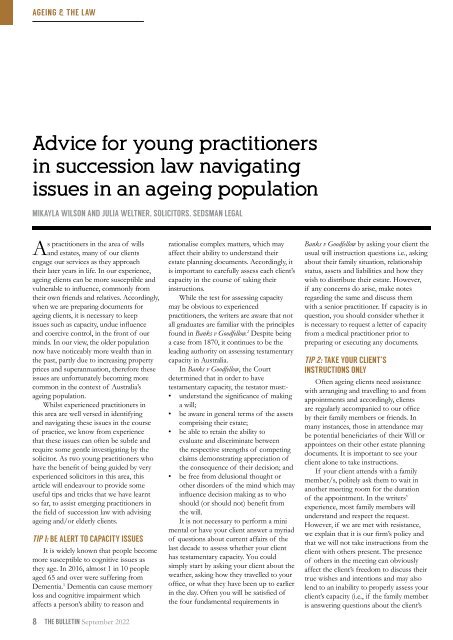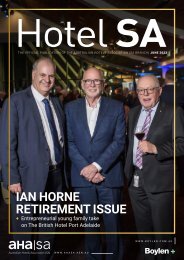LSB September 2022 LR
You also want an ePaper? Increase the reach of your titles
YUMPU automatically turns print PDFs into web optimized ePapers that Google loves.
AGEING & THE LAW<br />
Advice for young practitioners<br />
in succession law navigating<br />
issues in an ageing population<br />
MIKAYLA WILSON AND JULIA WELTNER, SOLICITORS, SEDSMAN LEGAL<br />
As practitioners in the area of wills<br />
and estates, many of our clients<br />
engage our services as they approach<br />
their later years in life. In our experience,<br />
ageing clients can be more susceptible and<br />
vulnerable to influence, commonly from<br />
their own friends and relatives. Accordingly,<br />
when we are preparing documents for<br />
ageing clients, it is necessary to keep<br />
issues such as capacity, undue influence<br />
and coercive control, in the front of our<br />
minds. In our view, the older population<br />
now have noticeably more wealth than in<br />
the past, partly due to increasing property<br />
prices and superannuation, therefore these<br />
issues are unfortunately becoming more<br />
common in the context of Australia’s<br />
ageing population.<br />
Whilst experienced practitioners in<br />
this area are well versed in identifying<br />
and navigating these issues in the course<br />
of practice, we know from experience<br />
that these issues can often be subtle and<br />
require some gentle investigating by the<br />
solicitor. As two young practitioners who<br />
have the benefit of being guided by very<br />
experienced solicitors in this area, this<br />
article will endeavour to provide some<br />
useful tips and tricks that we have learnt<br />
so far, to assist emerging practitioners in<br />
the field of succession law with advising<br />
ageing and/or elderly clients.<br />
TIP 1: BE ALERT TO CAPACITY ISSUES<br />
It is widely known that people become<br />
more susceptible to cognitive issues as<br />
they age. In 2016, almost 1 in 10 people<br />
aged 65 and over were suffering from<br />
Dementia. 1 Dementia can cause memory<br />
loss and cognitive impairment which<br />
affects a person’s ability to reason and<br />
rationalise complex matters, which may<br />
affect their ability to understand their<br />
estate planning documents. Accordingly, it<br />
is important to carefully assess each client’s<br />
capacity in the course of taking their<br />
instructions.<br />
While the test for assessing capacity<br />
may be obvious to experienced<br />
practitioners, the writers are aware that not<br />
all graduates are familiar with the principles<br />
found in Banks v Goodfellow. 2 Despite being<br />
a case from 1870, it continues to be the<br />
leading authority on assessing testamentary<br />
capacity in Australia.<br />
In Banks v Goodfellow, the Court<br />
determined that in order to have<br />
testamentary capacity, the testator must:-<br />
• understand the significance of making<br />
a will;<br />
• be aware in general terms of the assets<br />
comprising their estate;<br />
• be able to retain the ability to<br />
evaluate and discriminate between<br />
the respective strengths of competing<br />
claims demonstrating appreciation of<br />
the consequence of their decision; and<br />
• be free from delusional thought or<br />
other disorders of the mind which may<br />
influence decision making as to who<br />
should (or should not) benefit from<br />
the will.<br />
It is not necessary to perform a mini<br />
mental or have your client answer a myriad<br />
of questions about current affairs of the<br />
last decade to assess whether your client<br />
has testamentary capacity. You could<br />
simply start by asking your client about the<br />
weather, asking how they travelled to your<br />
office, or what they have been up to earlier<br />
in the day. Often you will be satisfied of<br />
the four fundamental requirements in<br />
Banks v Goodfellow by asking your client the<br />
usual will instruction questions i.e., asking<br />
about their family situation, relationship<br />
status, assets and liabilities and how they<br />
wish to distribute their estate. However,<br />
if any concerns do arise, make notes<br />
regarding the same and discuss them<br />
with a senior practitioner. If capacity is in<br />
question, you should consider whether it<br />
is necessary to request a letter of capacity<br />
from a medical practitioner prior to<br />
preparing or executing any documents.<br />
TIP 2: TAKE YOUR CLIENT’S<br />
INSTRUCTIONS ONLY<br />
Often ageing clients need assistance<br />
with arranging and travelling to and from<br />
appointments and accordingly, clients<br />
are regularly accompanied to our office<br />
by their family members or friends. In<br />
many instances, those in attendance may<br />
be potential beneficiaries of their Will or<br />
appointees on their other estate planning<br />
documents. It is important to see your<br />
client alone to take instructions.<br />
If your client attends with a family<br />
member/s, politely ask them to wait in<br />
another meeting room for the duration<br />
of the appointment. In the writers’<br />
experience, most family members will<br />
understand and respect the request.<br />
However, if we are met with resistance,<br />
we explain that it is our firm’s policy and<br />
that we will not take instructions from the<br />
client with others present. The presence<br />
of others in the meeting can obviously<br />
affect the client’s freedom to discuss their<br />
true wishes and intentions and may also<br />
lend to an inability to properly assess your<br />
client’s capacity (i.e., if the family member<br />
is answering questions about the client’s<br />
8<br />
THE BULLETIN <strong>September</strong> <strong>2022</strong>


















